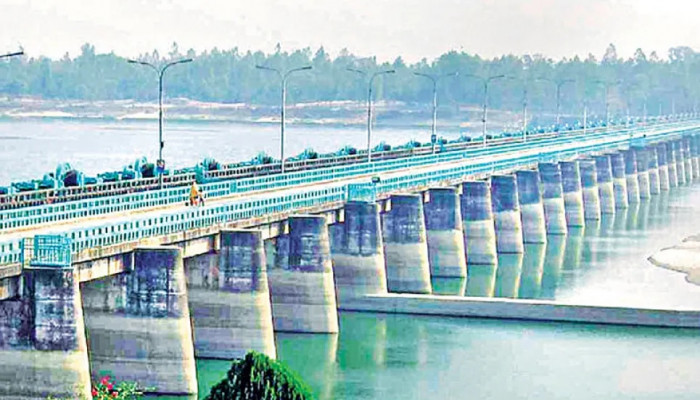India and China eye Teesta development project in Bangladesh
- In Reports
- 10:06 PM, May 08, 2024
- Myind Staff
Bangladesh's plans to dredge and develop its section of the cross-border Teesta River have sparked disagreement between India and China, amid escalating competition between the two Asian nations in the surrounding region.
China has been closely eyeing Dhaka's proposed Teesta River Comprehensive Management and Restoration project, valued at around $1 billion, for several years and has formally presented a proposal for its implementation. India has also expressed interest in participating in the project, recognising the significance of this cross-border river.
Efforts from both India and China have accelerated since the re-election of Awami League leader Sheikh Hasina as Bangladesh's prime minister in January, people familiar with the matter said on condition of anonymity. The Bangladesh government has not yet decided on who will execute the large-scale project or when the work on it will begin.
When questioned about the interest shown by both India and China regarding the Teesta project at an event held at Ananta Centre on April 30, Bangladesh High Commissioner Mustafizur Rahman stated that Dhaka has not yet received a formal proposal from New Delhi.
“I am aware of the Chinese proposal, I don’t know officially about the Indian proposal. Once it is placed and proposed, then I am sure that the concerned authorities [in Bangladesh] will look into it and see the viability and other aspects of that,” Rahman said without going into details.
According to the people cited above, although the Indian side has not submitted a formal proposal, the matter has been taken up with Bangladesh, both formally and informally, at several meetings.
“We would definitely not like this project to be given to China given the strategic and security implications,” one of the people mentioned above said.
Typically, large-scale projects assigned to China are carried out by state-owned enterprises. India is apprehensive about the potential for Chinese involvement in gathering critical data, including water flow information. The proposed site of the Teesta project in Bangladesh will also allow Chinese personnel to establish a presence near the Siliguri Corridor, also known as the "chicken's neck," a narrow land strip linking mainland India with the strategically important northeastern region.
India’s concerns in this regard have been conveyed to the Bangladesh side, the people said. The Indian side has also kept a wary eye on efforts by Chinese diplomats to pressure Bangladesh on the Teesta project.
In December of last year, China's ambassador to Bangladesh, Yao Wen, stirred controversy by announcing that Beijing had received multiple proposals for the development of the Teesta basin.
Back in October 2022, Yao's predecessor, Li Jiming, visited the Teesta barrage in Lalmonirhat district and stated that Chinese engineers were exploring the possibility of river dredging and conducting studies to determine a timeline for the project.
Bangladesh’s foreign ministry spokesperson responded to Yao’s remarks by saying that Dhaka will “take into cognisance the geopolitical issues” before deciding on the Teesta project.
During a trip to New Delhi last year, Prime Minister Hasina told reporters that Bangladesh is not obligated to consult with the Indian side regarding any activities on its portion of the Teesta River, which is one of the 54 rivers shared by the two countries. It is also the only river for which the two sides have not yet reached a water-sharing agreement.
In 2011, India and Bangladesh were poised to sign an agreement on sharing Teesta waters, but the plan was postponed due to opposition from West Bengal Chief Minister Mamata Banerjee. According to India's Constitution, the agreement of state governments is necessary for treaties concerning the sharing of water from cross-border rivers. Banerjee contended the treaty would leave parts of West Bengal dry.
Bangladesh, the biggest beneficiary of India’s “Neighbourhood First” policy through connectivity initiatives that have resulted in the creation of energy pipelines and road and rail links, has struck a cautious balance in accepting development aid from India and China.
Japan, a key partner in the Quad alliance alongside India, has strategically coordinated its development initiatives in both India's northeastern states and Bangladesh with a focus on countering China's influence. Japan has provided loans amounting to $1.2 billion to Bangladesh for the construction of the Matarbari deep seaport in Cox's Bazar district, aiming to establish a new industrial value chain that will also benefit the northeastern states of India.
Image source: The Business Post







Comments